Weekdays 8:00am-5:00pm Sat Closed Sun Closed
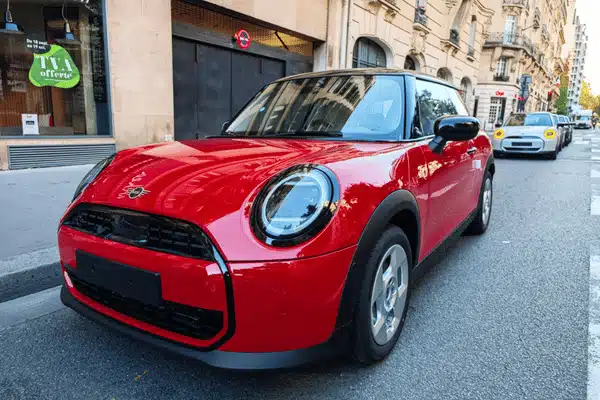
A well-maintained MINI Cooper can provide years of driving fun. Proper care determines how many miles you'll get from your investment.
MINI Coopers are fun cars with spirited handling that makes every drive feel like an adventure. But if you own one or want to buy a used car, you're probably wondering: how long do MINI Coopers last? The answer depends on several key factors, but with proper maintenance, these vehicles can deliver reliable service well beyond what many expect.
MINI Coopers reliable performance comes down to how you treat them. Most owners can expect around 150,000 miles before major components need attention. Some dedicated drivers have pushed their Minis past 200,000 miles with careful maintenance. The key is understanding what affects longevity and taking the right steps to maximize your car's lifespan.
How many miles can you realistically get from a MINI Cooper? Most MINI Coopers will serve you well for 150,000 miles with proper care. This translates to roughly 12-15 years of driving for the average owner putting on 12,000 miles annually.
Some sources suggest Minis can reach 250,000 miles under ideal conditions. However, high mileage Minis past 150,000 miles may require more frequent repairs and attention. The model year makes a difference too - newer models from 2014 onward show better reliability than earlier generations.
Real-world examples prove these numbers. Many owners report crossing the 100,000-mile mark with minimal issues. One enthusiast even documented over 260,000 miles on their MINI Cooper engine through dedicated maintenance. These success stories show what's possible when you prioritize taking care of your vehicle.
Most cars in this class struggle to match the MINI Cooper's combination of performance and longevity. While Toyota and Honda models might outlast them in pure durability, few other cars deliver the same driving excitement over such distances.
Your MINI Cooper engine needs consistent attention to reach mileage milestones. Oil changes using synthetic oil represent the most important maintenance task. Skip these, and you risk oil starvation that can destroy internal components.
Spark plugs require replacement every 30,000 miles on turbo models. Worn plugs reduce fuel efficiency and strain the engine. Fresh plugs maintain optimal fuel economy and prevent misfires that could damage other systems.
The water pump typically needs replacement between 60,000-100,000 miles. This component keeps your engine cool, and failure can cause catastrophic overheating. Replacing it proactively saves thousands in potential MINI Cooper engine problems.
Oil leaks are common as Minis age. Common trouble spots include the valve cover gasket and oil filter housing. Address these quickly to prevent low oil levels that could harm your engine. Regular inspection helps catch small leaks before they become major issues.
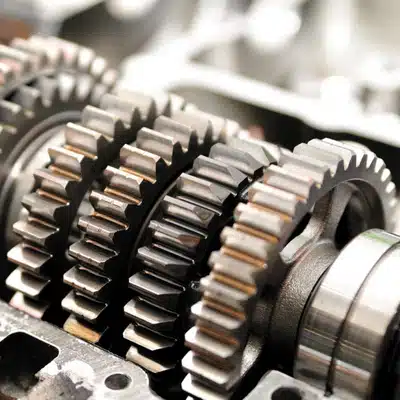
Manual transmission MINI Cooper driving is pure fun, yet clutch replacements arrive near 100,000 miles; fine driver habits prevent early wear.
Expect a new clutch in a MINI Cooper to cost $1,500 to $2,500 installed. That price is normal course stuff for manual BMW based MINI Cooper ownership. Budget it when a high mileage MINI Cooper is on sale and ask how long do MINI Coopers last.
MINI Cooper S automatics need fluid changes every 60,000 miles; fluid guards the MINI Cooper engine. Caring for the MINI Cooper engine and clutch keeps the MINI Cooper engine healthy, making MINI Coopers reliable.
The timing chain system causes problems in certain MINI Cooper models, particularly 2007-2010 S versions. Chain tensioner failure creates a rattling noise that warns of impending trouble.
Ignoring timing chain issues can destroy your engine. Replacement costs $2,000–3,000 but prevents catastrophic failure. If you hear rattling at startup, get it checked immediately.
Newer models improved this system, yet no timing chain lasts forever. Budget for replacement by 150,000 miles on any MINI Cooper.
MINI Cooper fuel efficiency and features attract; skipped MINI Cooper engine care cuts year average life. Features help you sell and protect the MINI Cooper engine.
First and second-generation Minis prioritized performance over ease of maintenance. These model year vehicles face more issues as they age, especially S models with supercharged or turbocharged engines.
Common problems include head gasket leaks, turbo failures, and electrical gremlins. Costly repairs become more frequent past 100,000 miles on these models.
The supercharged R53 Cooper S models are particularly challenging. The supercharger creates extra heat in an already tight engine bay. This stress accelerates wear on cooling system components and seals. Budget extra money for maintenance if you own one of these early performance models.
Current MINI Cooper cars show improved reliability thanks to BMW's refined engineering. The TwinPower Turbo engines address many earlier problems while maintaining the fun cars character that defines the brand.
J.D. Power gives recent models average reliability scores. While not Toyota-level dependable, they're significantly better than early Minis. The newer three-cylinder engines in base models prove especially durable when maintained properly.
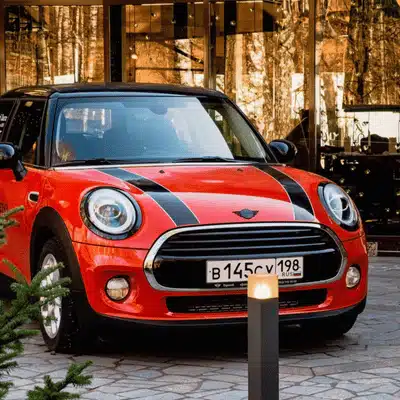
Your location affects how long your MINI Cooper will last. Hot climates stress cooling systems and accelerate rubber seal degradation. Cold weather brings different challenges - frequent freeze-thaw cycles can crack plastic components and stress the battery.
Road conditions matter too. Areas with poor roads accelerate components wear. Salt used for winter road treatment causes corrosion that shortens body and chassis life. Regular washing helps combat these effects.
Driving conditions in stop-and-go traffic create more detrioration than highway cruising. City driving means more heat cycles, brake applications, and gear changes. If most of your miles come from highway driving, expect better longevity from major components.
S models require premium fuel for optimal performance and longevity. Cheap gas can cause knock that damages internal engine components over time. The extra cost of premium fuel pays for itself in reduced engine problems.
Oil quality affects every moving part in your engine. Cheap conventional oil breaks down faster and provides less protection. Synthetic oil costs more upfront but extends drain intervals and protects better under extreme conditions.
Coolants are important for the water pump and entire cooling system. Use only BMW-approved coolant to prevent corrosion and seal damage. Mixing different coolant types can create chemical reactions that harm components.
Your driving style directly impacts longevity. MINI Coopers are fun vehicles built for spirited driving, but constant aggressive use shortens their lifespan.
Driving conditions play a role too. Highway miles are easier on components than stop-and-go city driving. Heat cycles from short trips stress the engine more than steady cruising.
In hot climates, pay extra attention to cooling system health. Brake pads and tires deteriorate faster with aggressive driving, but these are normal replacement parts that don't affect overall longevity.
Frequent short trips prevent the engine from reaching full operating temperature. This incomplete warm-up cycle can cause moisture buildup in the oil and exhaust system. Try to take longer drives regularly to let everything reach proper operating temperature.
These components typically need attention around 80,000 miles. Worn shocks affect handling and tire wear. Front control arm bushings are particularly prone to failure.
These repairs cost $500-1,500 but restore the Mini's signature handling. Neglecting suspension work leads to uneven deterioration and poor driving conditions.
The rear suspension on S types uses more complex components that cost more to replace. Budget accordingly if you own a performance variant.
Brake pads last 30,000-50,000 miles depending on driving habits. Rotors typically survive two pad changes before needing replacement. This maintenance schedule matches most vehicles and isn't unusual.
Performance vehicles with larger brakes cost more to service but provide better stopping power. The trade-off is worth it for the improved safety and performance.
Older Minis develop electrical problems as they age. Window regulators, sensors, and infotainment systems can fail. While annoying, these issues rarely strand you.
Keep the battery healthy - a weak battery causes strange electrical behaviors in modern vehicles. Replace it every 5 years or 50,000 miles. In hot climates like Texas, batteries may need replacement even sooner.
The complex electrical systems in newer vehicles create more potential failure points. However, most electrical issues are minor inconveniences rather than major reliability problems.
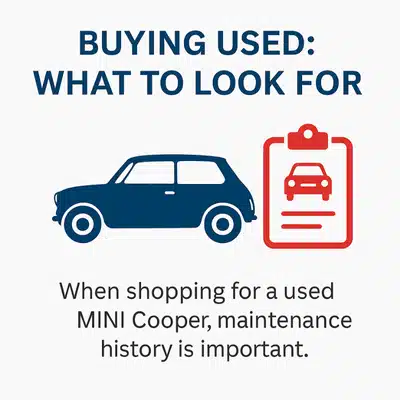
When shopping for a used car, maintenance history is important. A well-maintained MINI Cooper with 120,000 miles often proves more reliable than a neglected one with 60,000 miles.
The previous owner's care determines remaining lifespan. Look for service records showing regular oil changes, spark plugs replacement, and other scheduled maintenance.
During your test drive, listen for unusual noises, check that all features work properly, and watch the temperature gauge. Any engine problems should be addressed before purchase.
Inspect for signs of poor maintenance like dirty oil, worn parts with uneven wear patterns, or obvious leaks. These red flags suggest the vehicle may need immediate attention.
Consider an extended warranty when buying a newer used car. MINI Cooper repairs can be expensive due to imported parts and specialized labor. A comprehensive warranty might pay for itself if major issues arise.
Read warranty terms carefully. Some exclude deteriorate items like components and brake pads, while others cover major systems like the engine and transmission.
Third-party warranties vary widely in coverage. Research the warranty provider's reputation and claims process before committing.
Some MINI Cooper maintenance requires specialized tools and knowledge. Timing chain replacement, for instance, needs factory equipment and training to complete properly.
Basic maintenance like oil changes and brake pads can be DIY projects if you have the skills and tools. However, warranty work must be performed by certified technicians to maintain coverage.
Find a mechanic who specializes in European vehicles. Their experience with BMW and MINI Cooper systems will save you time and money compared to generic shops learning on your car.
Follow the factory maintenance schedule as a minimum. Use valuable oil and genuine replacement parts when possible. Your MINI Cooper is a premium vehicle that responds well to proper care.
Find a mechanic experienced with European cars. BMW and MINI Coopers share many components, so a shop familiar with both brands can provide better service.
Keep detailed maintenance records. This documentation helps with warranty claims and increases resale value when it's time to sell.
Warm up your engine before hard acceleration, especially on turbocharged wheels. After spirited driving, let the turbo cool down with a brief idle period.
Listen to your car. New noises or vibrations often signal developing problems. Early attention prevents minor issues from becoming major repairs.
Keep modifications minimal if longevity is your goal for your MINI Cooper. Power increases stress and may reduce reliability in a MINI Cooper. Save aggressive upgrades for a dedicated track MINI Cooper.
If you do modify your MINI Cooper, choose reputable brands and professional installation. Poor changes can require repairs and void warranty coverage on your MINI Cooper. Smart tweaks keep a daily MINI Cooper happy.
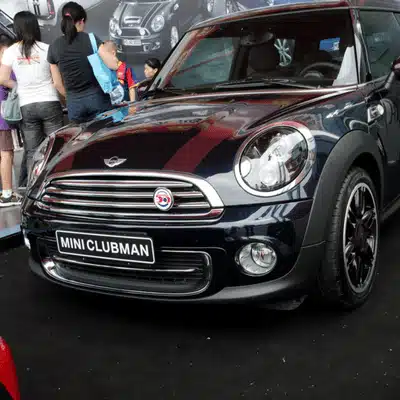
MINI Cooper ownership costs more than economy cars but less than luxury vehicles. Budget $1,200-2,000 annually for maintenance and repairs on a MINI Cooper.
Major services like replacements, timing chain work, and components represent the biggest expenses. Plan for these based on your car's age and mileage.
Compare this to Toyota or Honda cars that might need $800-1,200 annually. The difference reflects the MINI Cooper's premium engineering and performance focus.
Parts availability is generally good, though some components cost more than domestic vehicle equivalents. Plan accordingly when budgeting for maintenance.
MINI Coopers can last 150,000 miles or more with proper care. They're not the most reliable cars on the road, but they're far from the worst. The driving experience and unique character make the extra effort worthwhile for many owners.
Success depends on your commitment to maintenance and realistic expectations. A MINI Cooper won't be trouble-free like a Toyota Camry, but it will provide years of driving enjoyment that most vehicles can't match.
Taking care of your MINI Cooper vehicle means staying ahead of known issues, using proper parts, and addressing problems promptly. Do this, and your MINI Cooper can deliver reliable service well into high mileage territory.
The brand has earned loyalty from owners who appreciate the unique driving experience. While maintenance costs more than economy cars, the fun factor and distinctive style justify the expense for many drivers.
Ready to keep your MINI Cooper running strong? Don't wait for problems to develop. Schedule regular maintenance with us today. Your MINI Cooper will reward proper care with years of driving pleasure and reliable performance.


